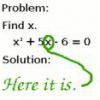 1
1bhaiya what is the graphical proof
 1
1Completing The Square We Get -
\left ( x+ \frac{b}{2a} \right )^{2} = \frac{b^2-4ac}{4a^2}
\left ( x+ \frac{b}{2a} \right ) = \sqrt{\frac{b^2-4ac}{4a^2}}
since for x to be real the quantity under square root must be greater than or
equal to 0 and denominator not equal to 0
hence,
{b^2-4ac}\geq 0
and
a\neq 0
 341
341ya, sorry i missed that bit out. :D
 21
21are r_{i} , r_{j} roots of the monic polynomial ? thnks.)
 341
341In general for any monic polynomial the expression
\prod_{i<j} (r_1-r_j)^2
expressed in terms of the coefficients is known as the discriminant and is helpful in deciding the nature of the roots
 21
21yes. nice proof. i gueess arnab was trying to write the same,)
 62
62Great proof shubhodeep, which inspires me to give a much much simpler proof....
p and q are the roots,
\\(p-q)^2=(p+q)^2-4pq\ge0 \\(-b/a)^2-4(c/a)\ge0 \\\frac{b^2-4ac}{a^2}\ge0 \\b^2-4ac\ge0
 21
21@nishant sir, one possible proof
as shown by arnab in post 11 p(i)p(-i) = b^2 + (c-a)^2
let the roots of p(x) be m , n , then p(x) = a(x-m)(x-a)
p(i)p(-i) = a^2 (1+ m^2)(1+ n^2) ;
So, b^2 + (c-a)^2 = a^2 (1+ m^2)(1+ n^2)
By C.S inequality a^2 (1+ m^2)(1+ n^2) \geq a^2(1+mn)^2 = a^2(1+ \frac{c}{a})^2
That means b^2 + (c-a)^2 \geq a^2(1+ \frac{c}{a})^2
which simplifies to b^2 \geq 4ac [1]
 62
62chintan, that was one proof i did extensively in the class..
remember px^2+q
and then what can u say if q is +ve/ -ve?
 1
1graphical way ...
f(x)=ax2+bx+c..
lets find where f'(x)=0
x0=-b2a
now for real roots
f(x0)≤0
this gives
b2-4ac≥0
i think this is what is in shubomoy's mind
 21
21b2< 4ac in the 1st place...
 21
21now let me establish my own sol................
let the eqn. havind b2<4ac has real root......namely α and β
so, b2<1ac
or, b2/a2<4c/a
or,(-b/a)2<4(c/a)
or,(α+β)2<4αβ
or,(α-β)<0
so this happens only when α and β are imaginary.............................
 62
62absolutely not.. this is a great question.. but lets see how many class xi guys are active here? :P
 49
49graphical proof is also easy and nice! (though grahical proofs are not accepted in RMO..Nishant Bhaiya told me! [2])
 21
21let p(x)=ax2+bx+c
so, p(i)=-a+bi+c
and P(-i)=-a-bi+c
P(i)p(-i)=(-a+bi+c)(-a-bi+c)
=(c-a)2-(bi)
=(c-a)2+b2
=a^{2}(\frac{c}{a}-1)+a^{2}(-\frac{b}{a})^{2}
let shubhodip do the rest because he has shown me this process............................
 30
30Why is everyone using the results? Trying proving the result (read Sreedharacharya's Rule).
 49
49Prove this in as many ways you can.
this is most important part! [3]
 1
1well the question is easy but hard to proove
let the roots are real then,
x = -b ± √b2 -4ac 2a is real
here -b and 2a is real but √b2 -4ac will be real if b2 - 4ac ≥ 0
if not the roots will be complex
 39
39Why not just complete the square and compare both sides after isolating x? Then if x is a real variable, the other side must also be real...apply certain restrictions on a square root function and voila.
 62
62no rahul..
a hint would be the proof of it
 36
36one logical way is
if b2 - 4ac < 0 then
d is less than 0 nd
by shree dharacharyas rule....
roots will not be real...
as a ngtive qty under root is imaginary.....